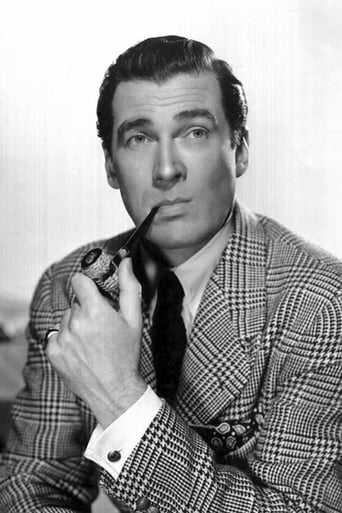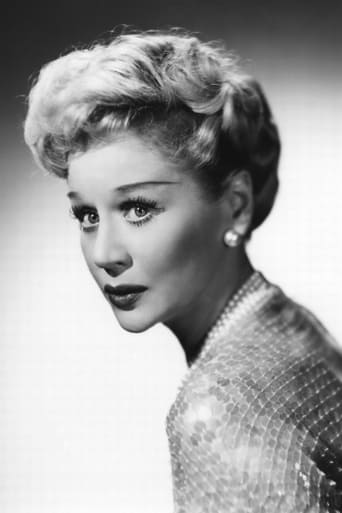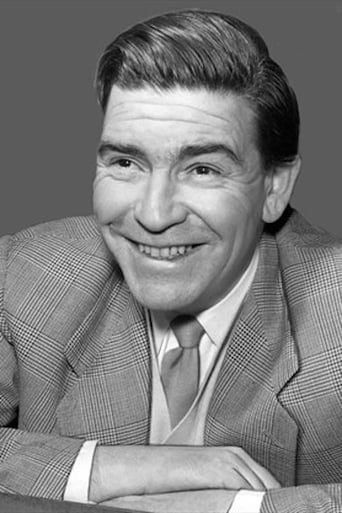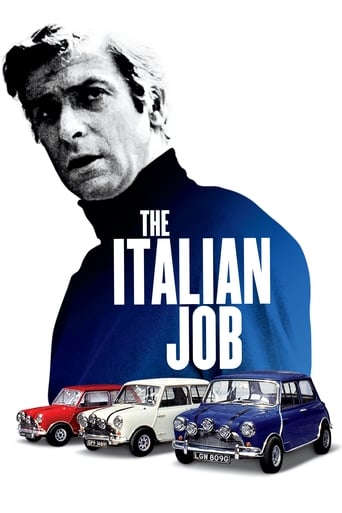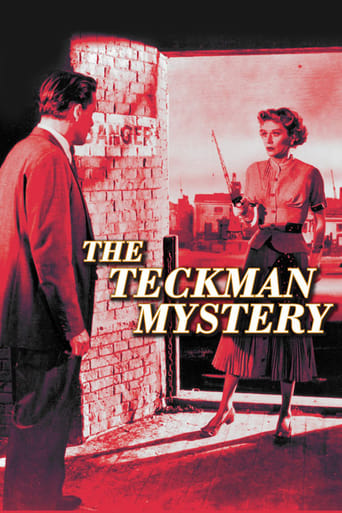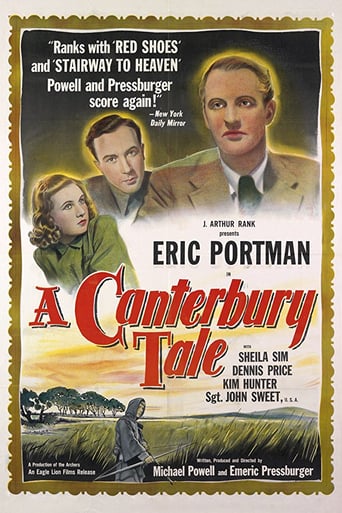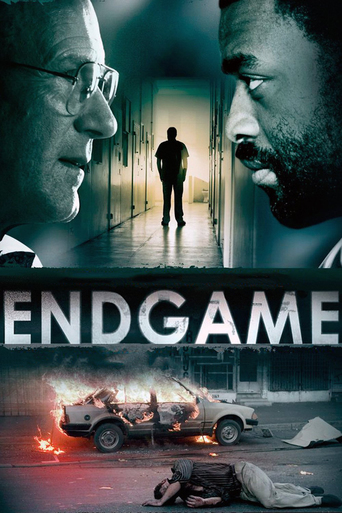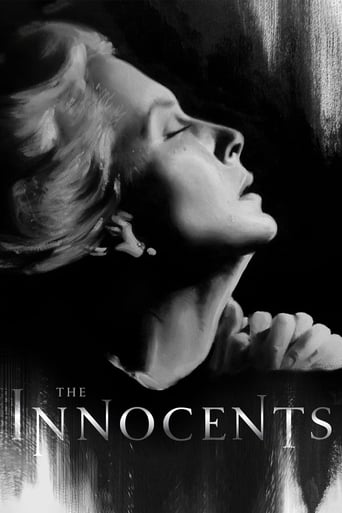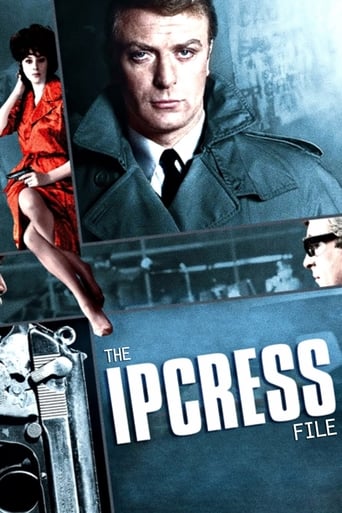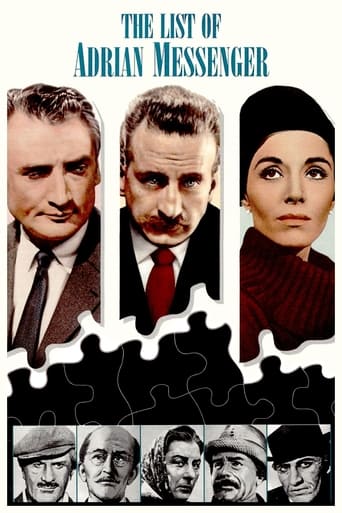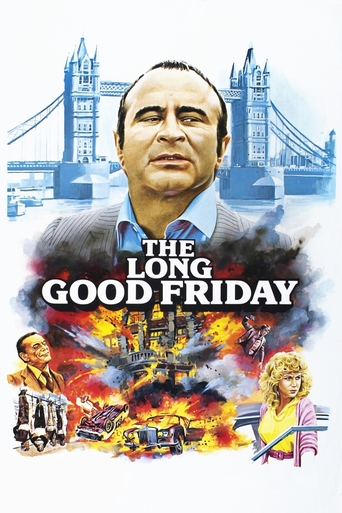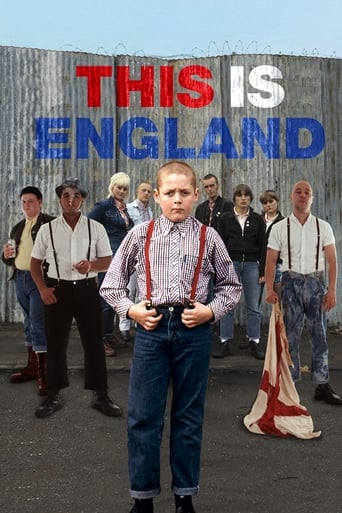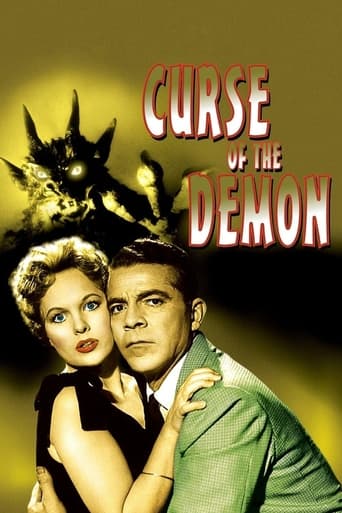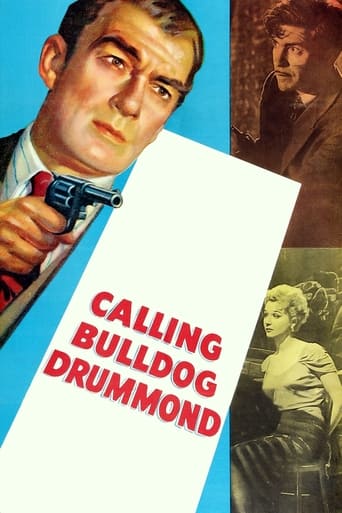
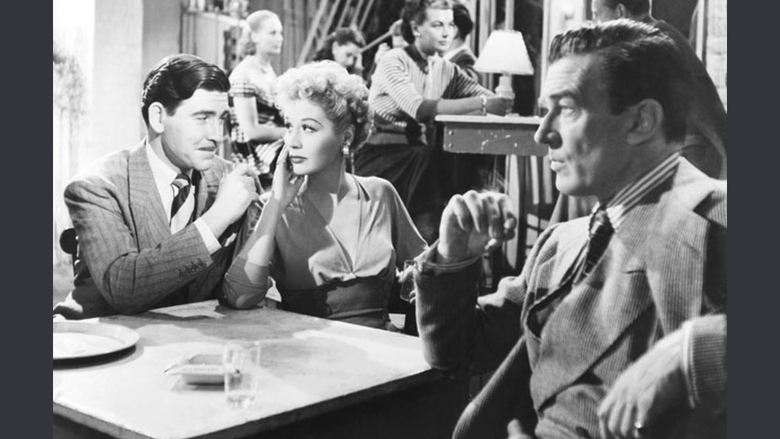
Calling Bulldog Drummond (1951)
Bulldog Drummond leaves retirement to help a Scotland Yard Sergeant catch thieves armed with radar.
Watch Trailer
Cast


Similar titles
Reviews
Having just watched "Bulldog Drummond" (1929) with Ronald Coleman, this film suffers greatly by comparison. In the first place, Coleman was the perfect screen Drummond, whereas Walter Pidgeon the lead in this picture lacks much of the bon vivant, devil may care persona of Coleman.The story takes place in London where a gang of criminals led by Arthur Gunns (Robert Beatty) and directed by an unseen boss, has been robbing big businesses all over London. Scotland Yard Inspector McIver (Charles Victor) goes to the retired Hugh "Bulldog" Drummond Walter Pidgeon), now raising prize pigs, for help. Drummond reluctantly agrees to come out of retirement to help.Drummond fakes his flight to Africa under the guise of having cheated at cards in an exclusive men's club, to "disappear" from sight. He is teamed up with Scotland Yard Sgt. Helen Smith (Margaret Leighton) to pose as rival crooks in order to infiltrate the gang.Gunns, suspicious at first, takes a liking to Smith much to the dismay of girl friend Molly (Peggy Evans). Molly by chance, discovers the plot by Drummond and Smith and......................................Walter Pidgeon, although a competent actor in his own right, was totally miscast as the sleuth Drummond. He has none of the humor and romantic nature or the British accent of either Coleman or of John Howard, who starred in the late 30s Drummonds. Margaret Leighton, on the other hand, is excellent as the undercover detective. David Tomlinson as Algy Longworth provides what humor there is but has little to do otherwise. In fact he doesn't appear with Pidgeon until three quarters of the way though the film. Robert Beatty, a Canadian sans British Accent, is a competent adversary. Bernard Lee ("M" in the early James Bond films) plays Colonel Wetson a member of Drummond's men's club.As a stand alone mystery, the film is not to bad but, as a revival of the Bulldog Drummond series, it fails miserably.
When I saw the famous MGM logo at the start of this picture, I was fairly certain that it was going to have considerably higher production standards than most, if not all, of the previous entries in the series, as MGM is famous for putting gloss even in its "B"-movie section. And I was right - this is the slickest of all the Drummond films (even the music score is pretty sweeping!). Is it the best? It might have been, but it gives away some of its secrets too soon; for example, the identity of the villainous No.1 would have made for a good surprise at the very end, but the audience learns his identity much earlier. Walter Pidgeon is a bit stodgy as Drummond, but he is surrounded by a fine cast: Margaret Leighton is natural and appealing as his female assistant (an example of early feminism, she gradually overcomes Drummond's "This is not a job for a woman!" doubts with her competence), Robert Beatty as the suave-sleazy villain, Peggy Evans as his jealous but smarter-than-she-looks moll, David Tomlinson as an almost ideal Algy (nowhere near as stupid as he is usually portrayed), and Bernard Lee as a fellow member of Drummond and Algy's "gentleman's club.". A fairly strong note for the series to finish on. **1/2 out of 4.
Starting in 1922 and through the early 1940s, many, many different actors played Drummond--and he even reappeared a few times after that. It wasn't until John Howard finally got the role and managed to play him six times that the series had any stability. Mostly, however, it consisted of an actor taking the helm for only one or two films--and including Ronald Colman, Ray Milland and Tom Conway. In total, there were 24 appearances by 14 actors--so consistency was NOT a strength of the Drummond series!! If they had stuck with only one or two actors, the series might have gained a wider following. So, seeing the American Walter Pidgeon taking on the role isn't that surprise--everyone seemed to be playing him! In many ways, this iteration of Drummond is different from earlier ones. The light-hearted sense of humor is missing and instead, the film seems a bit film noir in sensibilities. Part of this might be because Algy (the usual comic relief) is more of a minor character in this one. The baddies in the film also aren't afraid to shoot the police, the dialog is more tough and the lighting is, at times, very noir---and Algy brutally plugs one of the gang members at point-blank range. It certainly looked a lot more 50s in style! This film starts with an incredibly cool and well-designed robbery. Eight guys in trench coats, fedora hats and rubber masks efficiently steal a ton of cash in very workmanlike fashion. To assist them, the carry a backpack radio (like would have been used by troops during the war) to keep in touch with the boss who guides them. They do this all so neatly, you'd assume they will never get caught.Because three such split-second timed jobs have been executed with military efficiency, the police have decided to consult Hugh 'Bulldog' Drummond--who has been retired for some time. He agrees to go undercover and try to insinuate himself into the gang once he locates it--as Drummond always wants to do it the dangerous way! And, he's assisted by a pretty female from Scotland Yard. But can they manage to avoid detection? After all, this is a very smart gang! All in all, I really liked this style Bulldog Drummond film--a lot more than the earlier ones. Because it was much more realistic and gritty, the film seemed less like just another B-series film. It's a shame, though, that this film apparently didn't catch on and was the only one in which Pidgeon starred. My score of 8 is relative to other B-movies as well as the other Drummond films.By the way, look for a younger Bernard Lee as the nine-fingered man. You probably will recognize his face--he was the original 'M' from the Sean Connery, George Lazenby and Roger Moore films in the James Bond series. Also, notice that Drummond and Algy refer to British football as 'soccer'. Do the Brits ever refer to this sport as soccer? I thought only silly Americans (like me) call it that. I assumed they used that term since this film was made by an American studio.
This was the 21st Bulldog Drummond film, and was the last attempt at making a serious feature film based upon the character. It brought to an end 29 years of serious Drummonding, and the remaining four Drummond films were all absurd and worthless pastiches. So this was truly the end of an era. In the two previous Drummond films, the title role had been played by the suave and charming Tom Conway. This time Drummond was played by Walter Pidgeon, his single time in the role. Pidgeon was also suave and charming, but was not a young man by this time and lacked the energy and vivacity for the part. In any case, the director Victor Savile was clearly infatuated (if only in the directorial sense) with Pidgeon's female co-star in this film, the remarkable Margaret Leighton. We get plenty of closeups of her, but none of Pidgeon. Pidgeon was evidently happy to let Margaret Leighton steal all her scenes, as it must have amused him that in her role as a woman police officer masquerading with him as a crook to infiltrate a criminal gang of thieves, she was taking over the film. Pidgeon was not an egotist. I knew him slightly when I was young and he was old. Despite his impeccable manners of a gentleman, which were perfectly genuine, he could be a bit difficult at times and did not suffer fools gladly. He had an excellent sense of humour and laughed heartily and deeply. He was a passionate drinker of strong coffee, and the twinkle in his eye was natural and innate. Despite the many decades of difference in our ages, we 'clicked', and if circumstances had permitted, we could have had long and meaningful conversations, whereas our conversations were never long, and our acquaintance was passing. However, I gained enough of a personal impression of him to judge his worth, and that was high indeed. He was an extremely interesting, thoughtful, and amusing man, and he was far from superficial. He is best seen in 'Mrs. Miniver' (1942), for which he was nominated for an Oscar, and 'Advise and Consent' (1962). In this film he is just walking through the part, and although he manages the charm part of being Bulldog Drummond, he frankly does not manage the action part, and he was clearly under no pressure to do so, as the director was rather effete anyway, and Margaret Leighton was happy to do all the business, and was enjoying herself so much they all just let her get on with it. She was a magnificent actress, although she was best on stage, where I saw her a few times, and was dazzled by her stage presence. I had no idea during the time I knew him that Larry Harvey had once been married to her, as he never mentioned her. (But then he wouldn't, as it might have upset Paulene, I suppose, who is a fiery gal, or was back then.) This Drummond film does not have a trace of humour anywhere in it, not a single laugh, gag, or witty line. It is treated absolutely straight as a crime detection film. The cinematography was by Freddie Young, later famous for 'Lawrence of Arabia', 'Doctor Zhivago', etc., though there is little sign of his genius in this early effort. I knew him too, and he was a very quietly spoken and thoughtful fellow, wholly dedicated to his work, whom everyone liked, and I don't suppose anyone ever disliked. This Drummond film makes good watching, if only to see the amazing Margaret Leighton, and it does not disappoint as a Drummond film either except that Tenny, the Inspector, and Phyllis Clavering all are missing. Algy Longworth is there, played fussily by David Tomlinson, but he is not funny, nor does he try to be. As the last 'real' Drummond film, this one has an air of dignity about it, as the true series finally bows out and leaves the screen forever. It is not commercially available on DVD or video, and you have to be ingenious to acquire a copy from the right collector, as most of the television airings (where I first saw it) have ceased. Let's hope that some day an enlightened company will bring out a DVD set of 'The Complete Bulldog Drummond', because although the first silent film appears to be lost, the second does survive in a single copy, and it would be a fascinating thing to have all these films gathered together and accessible.


